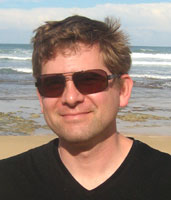

With extensive knowledge and experience in new media, Manson is a respected voice in the media and marketing industry. Heavy Chef  was honoured to sit down with him as he shared advice for writers navigating the online space and how to best speak to 'The Digital Generation.'
was honoured to sit down with him as he shared advice for writers navigating the online space and how to best speak to 'The Digital Generation.'
 Hello, Herman. You have extensive experience in digital media. Tell us three key things you need to keep in mind while writing for the digital generation?
Hello, Herman. You have extensive experience in digital media. Tell us three key things you need to keep in mind while writing for the digital generation?
Herman Manson: Any reader from any generation demands respect for their intellect - making stories accessible doesn't mean you need to dumb them down. It's easy to get wrong - especially in business and trade writing. Readers won't accept a piece that talks down to them.
At the same time, when I write, my writing style needs to create a consistent voice so they can relate to me as a person and journalist, because in digital, media is personal, both because of the ease of interaction between readers and journalists, but also because if they read the full story rather than just the first paragraph and the headline, they are engaged, and that matters in an attention-deficit economy.
I keep to the facts, don't take ages to put across an opinion, and even when I do long-form journalism, I don't drag out the argument when it's unnecessary. That they will form their own opinion on the subject, if they don't have one already, and they have access to vast amounts of information and opinion a browser tab away to help them do so.
They are bound to share content they find relevant with their online and offline networks and there might well be a degree of engagement around a story, even after it ran, and that I need to look out for. As writers, we can't be afraid of debate and discussion around our work. We can, however, demand it be respectful, and where possible not anonymous, rather than abusive (as is prone to happen in many online forums).
Just a quick extra - any reader wants something that isn't recycled, that's thoughtful and accurate - that is, honest, well-researched and factual.
 Original content is still key but the constantly evolving nature of the web creates a dynamic landscape for writers. How can writers use this?
Original content is still key but the constantly evolving nature of the web creates a dynamic landscape for writers. How can writers use this?
Manson: I love the fact that Google is now offering journalists workshops on data-driven reporting. The web is a great research tool [read the tips from computer-aided reporting expert Izak Minnaar at the end of this interview with him - managing ed]; it also allows for a greater level of interactivity between writers and readers, in crowd sourcing information, in creating media platforms for publication and getting the word out and discussion going on stories.
I've always experimented with online media, a topic I started writing on soon after the commercial Internet launched in South Africa, and it has taken me from email newsletters to websites, flip-page style online magazines to social networks. I've left jobs because publishers wouldn't allow me to experiment with online publishing on my own time.
For me as a writer it's a non-negotiable - this is where the readers are - I need to be here.
I've found that the nature of the web also influenced the nature of my media instincts - it's much more collaborative, thanks to the web, and I like to think it gives me a broader view of journalism than print media ever could.
 What role does an online audience play in the shaping of content strategies? How much control do they really have at the end of the day?
What role does an online audience play in the shaping of content strategies? How much control do they really have at the end of the day?
Manson: It's a bit of a coin-flip, really. If a site allows lots of anonymous bile in the feedback and comment sections, writers and editors do draw back. This doesn't do a publication or its readers any service and few things are as dangerous as self-censorship in journalism. I think anonymous forums have done writing published in the digital domain few favours and have diminished our ability to hold constructive debate.
Of course, the web also allows editors and publishers to see what topics are most popular, what drives search-engine traffic to a site and what pages are viewed most often, what gets retweeted etc. Journalism could become even more commoditised than it already is when publishers produce content only to satisfy 'consumer' (and often this is how publishers view their readership - consumers ready to be monetised) wants or needs.
I've already said media has become personal. Well, in an environment like this, stories are more than simply 'content', and discerning readers know that - even if publishers still have to figure that out.
 Describe the difference between the offline reader and the online reader and what this means for those crafting copy for online reading.
Describe the difference between the offline reader and the online reader and what this means for those crafting copy for online reading.
Manson: Offline, you buy a magazine or a newspaper, a product made up from lots of smaller bits and pieces, some of which you will read and some of which you fill flip past, but the editors are betting somewhere in there you will find one or two stories you will enjoy and will make you buy the magazine again.
Online allows readers to zoom in on their niches of interest - it takes the shotgun approach of traditional media out of the equation. You would think this would make publishers focus on quality, rather than quantity, in the online environment but sadly that is not the case.
 You have experience in both traditional and new media publishing. How can people best use the online space to enhance traditional publishing practices?
You have experience in both traditional and new media publishing. How can people best use the online space to enhance traditional publishing practices?
Manson: By realising that their readers have lots to say, that they want to engage, that they want to be part of something worthwhile, and that digital media offers such a platform much more effectively than print ever will. Let them co-create and collaborate - it's the kind of engagement print editors always wished [for]!
 Your award-winning article looked at how social media is eroding the ethics of journalism. How is it affecting the ethics of writing as a whole and can this be avoided?
Your award-winning article looked at how social media is eroding the ethics of journalism. How is it affecting the ethics of writing as a whole and can this be avoided?
Manson: Look - a brown envelope erodes the ethics of journalism with much more ease than social media ever will - I wasn't saying social media is bad for media ethics or for journalism. I was saying that, as journalists (and writers), we need to recognise that the principles, such as they are, of journalism translates in new and innovative ways onto new media.
It's up to us to investigate the ways in which it impacts on how we spread news, on how it impacts on our reputations and credibility, and that won't happen with us cowering in some corner because we are afraid we might make a mistake on Twitter.
Explore, innovate, share ideas - we are establishing best practice on new and incredibly exciting platforms [it was Manson who suggested to me to start incorporating Twitter handles in Biz writer bylines a couple of years ago - managing ed]. Let's be brave and embrace the challenge.
By the way, I was just reading an interesting story on creating a 'neutral tweet' or NT retweet option for journos [read Alastair Otter's thoughts on the matter, in response to Manson's tweeting about this idea yesterday, Wednesday, 9 November - managing ed]. This is what I mean with innovating and not being afraid to throw an idea out there!
• Republished and adapted with permission from a Heavy Chef blog post originally posted on 10 November 2011.
